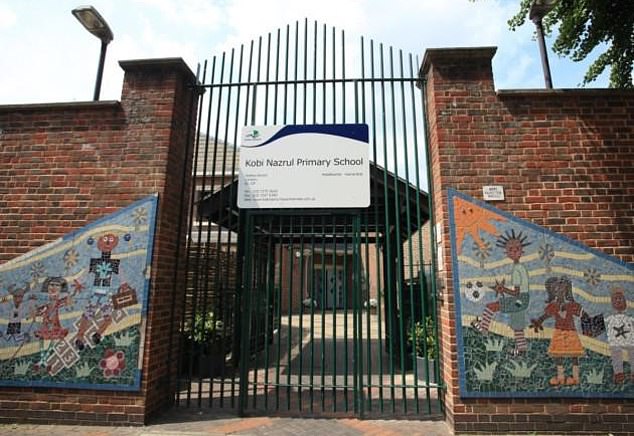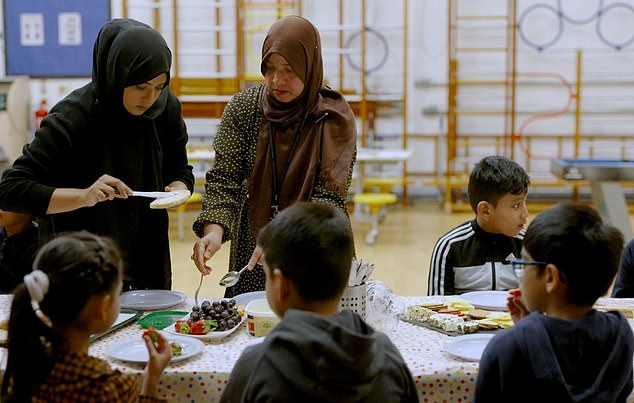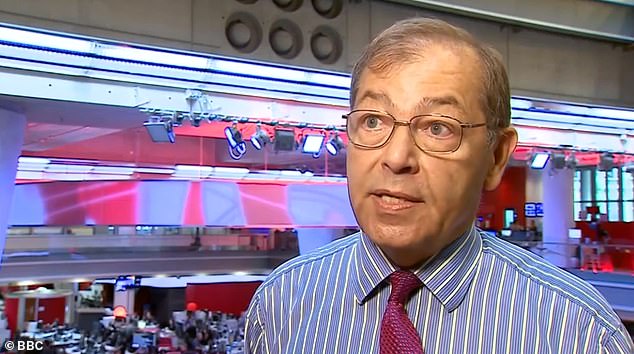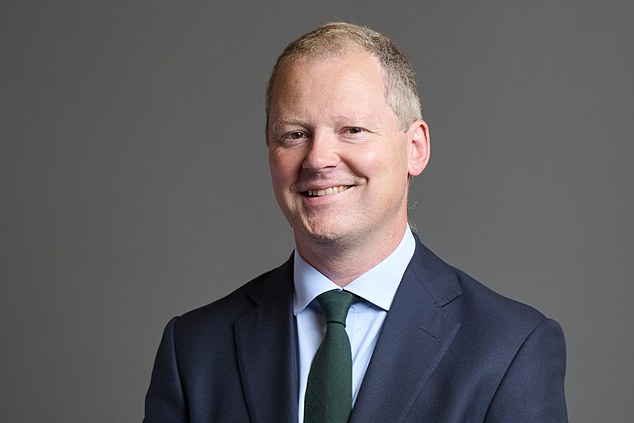English is no longer the first language for the majority of pupils at more than 2,000 schools, MailOnline can today reveal.
No children at two primary schools – one in Tower Hamlets and another in Kirklees, West Yorkshire – have English as their mother tongue.
Our statistics, obtained exclusively under Freedom of Information (FOI) laws, show nine in ten pupils don’t speak only English at home at 107 schools.
The full results of our audit, covering all 22,000 state schools, can be viewed in our search tool below.
Bengali is the mother tongue of 92 per cent of the pupils at Kobi Nazrul, the primary school in Tower Hamlets where none of the kids solely speak English at home. The others speak a slew of other languages, including Indonesian and Urdu.
At Pentland Infant in Dewsbury – the Kirklees school – the overwhelming majority of the children speak either Gujarati (36 per cent) or Panjabi (45 per cent).
When broken down by languages, our FOI revealed Tottenhall Infant School, Enfield had the highest rate of Albanian speakers at 18 per cent.
Sheffield’s Netherthorpe Primary School topped the league table for Arabic (54 per cent), meanwhile Burnley Brow Community School in Oldham had the highest share of Bengali speakers (93 per cent).
In terms of Chinese, St Cecilia’s CofE Primary School in Wokingham, Berkshire, had the highest rate (28 per cent).
Polish speakers were most heavily concentrated at St Cuthbert’s Catholic Primary School in Windermere (43 per cent), while Urdu was most common at St Michael’s CofE Primary School in Bolton (58 per cent).
In total, English is no longer the first language for the majority of children at 2,039 schools. This includes deaf schools, where pupils’ first language is BSL.
Nationwide, English isn’t the first language of 1.8 million pupils, or one in five pupils.
Fuelled by immigration having spiralled to all-time highs, this has risen from 1.1 million ten years ago.
The soaring numbers have raised concerns among critics that the slew of different languages can be incredibly disruptive in classrooms.
Robert Bates, of the Centre for Migration Control, told MailOnline: ‘It’s a great shame that we have reached this point and it is evidence of successive governments failing to properly address assimilation issues.
‘Multi-language classrooms are hugely problematic. They inevitably sap the precious time of teachers who are forced to devote additional attention to those with a weaker grasp of the language at the expense of those who only speak English.
‘The resources used will be lowest-common-denominator teaching devices that provide little from the individuals to excel.
‘They also foster long term division, with little incentive for those who do not speak English to improve their fluency.
‘It is time for a sink or swim approach in which state funding for translation costs are stripped across the board, encouraging adult migrants and parents alike to devote greater attention to improving this pretty basic skill.’
Schools have had to pivot their limited resources to provide for the needs of pupils who struggle with English.
Strain has been placed on their tight budgets due to providing translated versions of resources, adding subtitling and voiceovers, as well funding in-class interpreters.
Teachers have previously said schools were under mounting pressure from mass immigration and called on ministers to fund them properly to cope with the array of different languages that pupils speak.
MailOnline’s analysis showed the authority that had the highest rate of first language speakers other than English was Newham (66.4 per cent).
Brent (63.7 per cent) and Harrow (63.6 per cent) rounded out the top three.
On the other hand, our FOI found 97 per cent of children spoke English as their first language in Northumberland.
Redcar and Cleveland (96.7 per cent) and Cornwall (96.1 per cent) came second and third, respectively.
Experts warn that kids who aren’t taught English before they get to school are less likely to do well.
Ian Mansfield, head of education at Policy Exchange, said: ‘These statistics demonstrate the very real pressure that mass immigration places on public services.’
However, some studies suggest that pupils who speak English as a second language can outperform native speakers and their presence has no impact on the learning of other pupils.

Pictured: Kobi Nazrul school, where no pupils speak English as a first language

Despite the language barrier, Kobi Nazrul was regarded as ‘friendly and welcoming’ in a glowing report from Ofsted in its most recent inspection
Depending on how close they are to English, both phonetically and grammatically, some languages can be very difficult to switch from.
Alp Mehmet, of Migration Watch UK, said: ‘English is the glue that brings and holds us together as a country and helps new arrivals to blend in.’
Mr Mehmet, who said he was the only non-English speaker at his east London school growing up in the 1960s, added: ‘If teachers have to focus their attention on children who struggle to speak English because the language spoken at home is different, the time devoted to other pupils is bound to diminish.’
Jim McConalogue, CEO at the think-tank Civitas said: ‘You are effectively seeing the proportion of school-age pupils in England speaking English as an additional language continuing to steadily increase over time.
‘Measures to ensure English language acquisition must therefore be prioritised.
‘There are some short-term challenges that the DoE need to address for students who speak English as an additional language, as a lack of emphasis on English language provision can have a detrimental impact on both these students themselves and their classmates.

Alp Mehmet, of Migration Watch UK, argues that if teachers have to focus their attention on children who struggle to speak English, the time devoted to other pupils is bound to diminish
‘Many policymakers talk about diversity and inclusion, but relatively little is being done to support English language acquisition.
‘This omission creates deeper problems not only for the individual children but society at large, around a common citizenship, a shared language and identity, belonging and social cohesion.’
Some politicians believe the high number of immigrants now entering the UK need to be integrated into society by the government properly.
Shadow education minister Neil O’Brien said: ‘These figures underline just how serious the challenge of integration has become in some parts of the country.
‘Integration shouldn’t be an afterthought, it must be a priority.
‘The government has totally failed to stop the boats and numbers coming illegally are massively up.
‘They abandoned our plans to raise income requirements on the family route. And as well as having no plan on immigration they have no plan on integration.’
Some campaigners argue the Government needs to have more involvement in schools that have especially high numbers of foreign language speakers.
Chris McGovern, of the Campaign for Real Education, said: ‘The Government should publish the data regarding the language of pupils in each school and ensure that non-native speakers do not outnumber native speakers of English.
‘This will benefit all pupils and allow our society to become more integrated, harmonious and at peace with itself.’

Chris McGovern, of the Campaign for Real Education, believes the Government should ensure that non-native speakers do not outnumber native speakers of English in schools

Shadow education minister Neil O’Brien said: ‘These figures underline just how serious the challenge of integration has become in some parts of the country’
The FOI data, from the Department of Education, reflects the state-of-play in January 2024.
In it, schools have some flexibility about how they code pupils’ language.
DoE bosses define the first language as ‘where the pupil has been exposed to a language other than English during early development and continues to be exposed to this language in the home or in the community’.
A Government spokesperson said: ‘This government is determined to break down barriers to opportunity so every child, including pupils who speak a language other than English, can achieve and thrive.
‘Schools are best placed to understand the needs of their pupils with English as an additional language and are responsible for determining what support to put in place.
‘Additional funding is provided to schools to support pupils who need help learning how to speak, read and write English.
‘More widely, to better integrate migrants into their new communities this government will introduce a new English language requirement across a broader range of immigration routes.’
MailOnline’s investigation comes after Keir Starmer last month warned that mass immigration risks making Britain an ‘island of strangers’.
Scrambling to blunt the threat of Reform, the Prime Minister vowed to give Brits what they had ‘asked for time and time again’. He unveiled a package to ‘take back control of our borders’.
The skills threshold will be hiked and rules on fluency in English toughened under the Government’s plan to bring down annual inflows by around 100,000.












